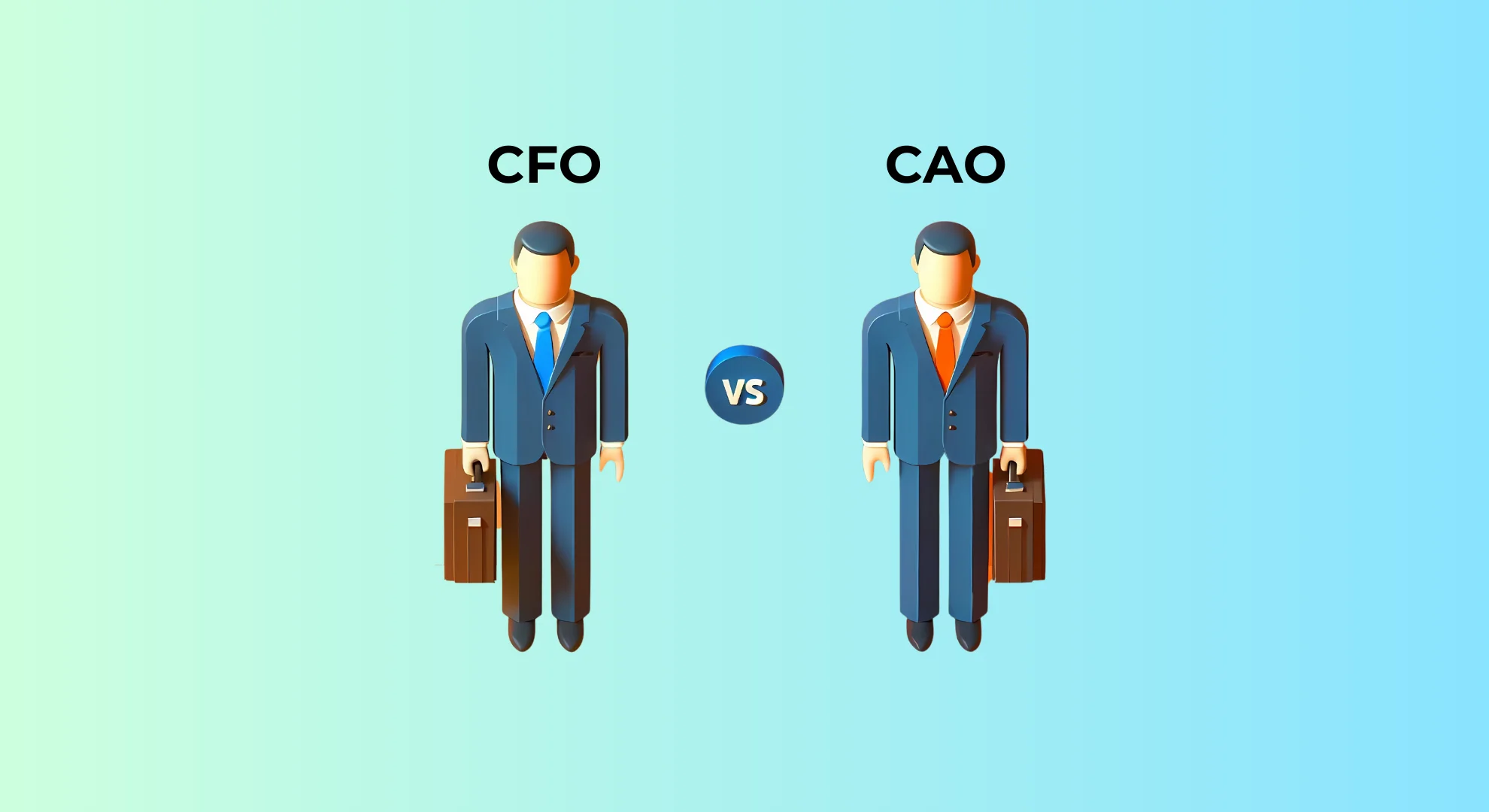Ever feel lost in the maze of C-suite titles? CFO and CAO seem finance-related, but what truly sets them apart? Don’t worry—we’re here to clear the air and break down the key differences between these two essential leadership roles in the financial world. Imagine your company’s finances as a mighty jet. You need a skilled crew at the helm to reach cruising altitude and soar toward success. The CFO and CAO are two crucial members of this crew, each playing a distinct role in keeping your financial engines running smoothly.
Table of Contents
CFO vs CAO: Roles
The Visionary Captain: The CFO
Think of the CFO as the captain of your financial jet. They’re the big-picture thinker, charting the course for long-term success. Their keen eye scans the economic horizon, making strategic investment decisions, managing risks, and ensuring the company stays financially stable.
Here’s a glimpse into the CFO’s responsibilities:
- Financial Planning & Strategy: The CFO develops long-term financial plans and forecasts, ensuring the company has the resources to reach its goals.
- Investment Decisions: They identify and analyze potential investments that fuel growth and maximize returns for the company.
- Risk Management: Anticipating and mitigating financial risks is critical to the CFO’s role. They implement strategies to protect the company from unforeseen financial turbulence.
- Investor Relations: The CFO builds strong relationships with investors and analysts, keeping them informed and confident about the company’s financial health.
The Master Mechanic: The CAO
While the CFO charts the course, the CAO acts as the skilled mechanic, meticulously ensuring the engine room – the day-to-day accounting operations – runs like clockwork. They oversee payroll, accounts payable and receivable, and financial reporting accuracy.
The CAO’s core focus areas include:
- Accounting Operations Management: Overseeing all accounting activities, ensuring smooth daily financial functioning.
- Financial Reporting & Compliance: Guaranteeing accurate and timely financial reporting that follows regulations.
- Internal Controls: Implementing robust internal controls to safeguard financial assets and mitigate fraud risks.
- Accounting Technology: Evaluating and implementing financial technology solutions to streamline operations and enhance efficiency.
Collaboration is Key
The decision to have a CFO, a CAO, or even both depends on your company’s size and complexity:
- Smaller Companies: Smaller organizations might have a single financial superhero, the CFO, handling all aspects of finance.
- Larger Companies: Larger entities with intricate financial structures often benefit from a powerful duo – a CFO providing strategic direction and a CAO ensuring meticulous accounting operations.
Regardless of the structure, clear communication and collaboration are the cornerstones of a successful financial leadership team. When the CFO and CAO work together, they become a formidable force, confidently navigating the financial markets and propelling your company toward a bright and prosperous future.

Building Your Dream Financial Team: CFO vs CAO
Now that you understand the distinct roles of CFO and CAO, how do I choose the exemplary financial leadership for my company? As with most things in business, the answer depends on your specific needs. Let’s explore some key factors to consider:
Company Size and Complexity:
- Smaller Companies: A single, well-rounded CFO might be sufficient for startups or smaller businesses with relatively straightforward financial structures. They can effectively handle strategic planning, day-to-day accounting operations, and investor relations.
- Larger Companies: As companies grow and their financial structures become more complex, the workload can become overwhelming for a single individual. This is where a dynamic duo of CFO and CAO shines. The CFO can focus on high-level strategy and external relationships, while the CAO oversees the intricate details of internal accounting operations.
Industry and Regulatory Environment:
- Highly Regulated Industries: Certain industries, like finance or healthcare, have strict regulations and reporting requirements. A CAO with a deep understanding of these regulations can ensure compliance and mitigate risks associated with non-compliance.
- Fast-Paced Growth: Companies experiencing rapid growth require a CFO who can adapt financial strategies quickly and identify new investment opportunities.
Balancing Strategic Vision with Operational Efficiency:
A strong CFO who can translate strategic vision into actionable financial plans is crucial for long-term success. An equally important piece of the puzzle is a CAO who can ensure these plans are executed flawlessly through efficient and accurate accounting processes.
Also Read: CEO vs CFO vs COO – CSuite Differences
Investing in the Right Talent: The Qualities You Need
Recruiting the right individuals for CFO and CAO positions is paramount regardless of your company structure. Here are some essential qualities to look for:
- Strong Financial Expertise: Both roles require a solid understanding of accounting principles, financial analysis, and risk management. A good candidate must possess financial modeling skills and be capable of converting intricate financial information into practical conclusions.
- Leadership Skills: The CFO, in particular, needs strong leadership qualities to inspire and guide the finance team. They should be able to communicate the strategic vision effectively, motivate staff, and delegate tasks effectively. The CAO should also be able to lead and motivate accounting staff, fostering a culture of accuracy and efficiency.
- Communication Skills: CFOs and CAOs must communicate efficiently with internal and external stakeholders. The CFO needs to be able to communicate complex financial information clearly and concisely to investors, analysts, and the board of directors. The CAO needs to communicate effectively with other departments and ensure everyone understands the financial implications of their actions.
- Strategic Thinking: While the CFO leads strategic planning, the CAO should also understand how day-to-day operations contribute to the financial strategy. They should be able to anticipate potential challenges and propose solutions that align with the company’s long-term goals.
- Technology Savvy: In today’s digital age, CFOs and CAOs must be comfortable with technology. They should be familiar with financial technology (FinTech) solutions and be able to leverage them to streamline operations and improve efficiency.
Building a Cohesive Unit: CFO and CAO Working Together
By carefully considering your company’s needs and recruiting talented individuals who complement each other’s skill sets, you can build a robust financial leadership team that propels your company toward sustainable growth and success.
Here’s what a well-functioning CFO-CAO partnership looks like:
- Defined Roles and Responsibilities: Having clear boundaries and understanding each other’s roles is crucial for avoiding overlap and ensuring seamless collaboration.
- Open Communication and Collaboration: Regular communication between the CFO and CAO fosters a culture of trust and transparency. Sharing information allows them to make informed decisions that benefit the company.
- Mutual Respect and Appreciation: Recognizing and respecting each other’s expertise and contributions is essential for building a solid working relationship.

Conclusion
The world of finance can be intricate and constantly evolving. CFOs and CAOs are vital in navigating these challenges and ensuring an organization’s economic health. Understanding each position’s distinct functions and strengths empowers you to make informed decisions about your financial leadership structure.
Whether you require a single, well-rounded CFO or a dynamic duo of CFO and CAO, the key lies in fostering a collaborative environment built on clear communication and shared goals. Investing in the right talent and encouraging teamwork can make a financial leadership team that confidently charts your company’s course, ensuring a prosperous future. Remember, a well-oiled financial engine is crucial for propelling your profit jet toward new heights!




















